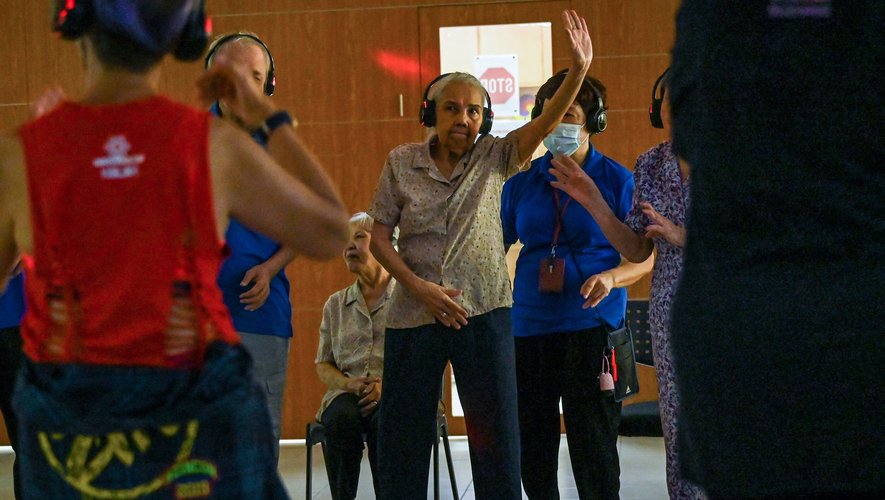(AFP) – Under the lights of a disco ball, patients suffering from more or less advanced dementia hold hands and dance on old tubes, in a nursing home in Singapore.
They let off steam on classics from the 1940s to the 1980s, for an hour, wearing headphones, in this silent discotheque.
The playlist, made up of tracks in English, Malay or Chinese dialects, was designed to get them dancing by staff at Apex Harmony Lodge, a residence that cares for people with neurodegenerative diseases.
“I don’t really know how to dance, but I have fun, I don’t care,” said Christine Chong, 54, who has early dementia.
Another resident, Goh Kian Ho, 63, sings enthusiastically as he claps his hands and feet in rhythm as he listens to a song in Hokkien, a language in southeastern China.
“We can play, we can sing, that’s fine,” he says.
When the band begins to tire of that happy boogie-woogie, the DJ slows down the beat with a 1970s classic by Taiwanese singer Teresa Teng, “The Moon Represents My Heart.”
A staff member encourages residents to raise their hands and sway as they listen to this emotional ballad.
Singapore, like many countries in Asia, is facing an aging population and increasing cases of dementia.
Singapore’s Ministry of Health estimates that 86,000 people — one in 10 aged 60 and over — suffer from these disorders and that number is expected to rise to 152,000 by 2030.
Scientific studies show that music therapy can be useful for people with some of these disorders such as Alzheimer’s disease, which begins with memory loss and can lead to speech or cognitive difficulties.
“We play old songs, and that helps trigger emotions that are often associated with certain memories from their past, so that helps them and it gives residents comfort and a familiar environment,” says Grace Wong, a psychologist working with Apex Harmony Lodge.
– “The soundtrack of their lives” –
This silent disco, held weekly, was inspired by similar experiences in the UK and Australia.
It was adapted to local musical tastes by Singaporean Johnson Soh, a former music industry executive who set up his company offering music programs for senior citizens.
He started this project after noticing that the music of his youth helped his father, who suffered from dementia.
“He was my first guinea pig, his abilities have been improved.”
More than 10 institutions in Singapore have adopted the program since it started in 2019, according to Johnson Soh.
Entitled “The Tea Dance is Back”, this initiative aims to recall the fond memories associated with these popular events for young people in 1960s Singapore.
“Everyone associates a soundtrack with their life, there are always pieces of music that impact our existence.”
“It’s inexplicable, but I think music is something that really moves people.”
On the track, the elders continue to dance and sing in chorus “Que Sera Sera” by Doris Day.

